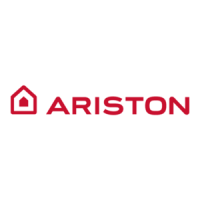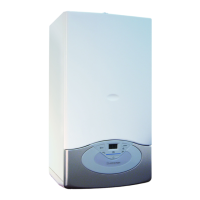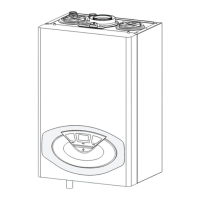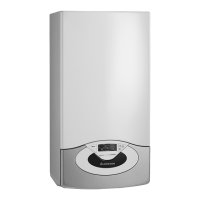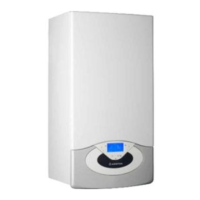Fitting the Coaxial Flue
(Ø 60 / 100 Vertical)
Note: See table for maximum and minimum ue runs.
Contents:
1x Silicone O-Ring (60mm)
1x Conical Adaptor (60/100mm)
1x Vertical Flue Kit (80/125mm)
3x Screws
The vertical ue kit is supplied with a specially designed weather
proof terminal tted, it can be used either with a at roof or a
pitched roof.
The Vertical ue kits useable lengths with the pitched roof
ashings are indicated in Fig. 7.
Before proceeding to t the ue, ensure that the maximum
ue length has not been exceeded (See the tables) and that
all elbows and bends have been taken into consideration, the
maximum ue length is see table, for each additional 90° elbow
1 metre must be subtracted from the total ue length, and for
each 45° 0.5 metres must be subtracted from the total ue length
(the height of the vertical adaptor and a 45° bend can be seen in
Fig. 8).
Mark the position of the ue hole in the ceiling and/or roof (see
Fig. 7 for distance from wall to the centre of the ue).
Cut a 130mm diameter hole through the ceiling and/or roof and
t the ashing plate to the roof.
DO NOT cut the vertical ue kit.
To connect the vertical ue kit directly to the boiler, place the
vertical starter kit (Part No. 3318079) (see Fig. 7) onto the exhaust
manifold and secure with the clamp, t the vertical adaptor onto
the vertical starter kit (note: there is no need to use a clamp to
secure this as it is a push t connection), the vertical ue kit must
then be inserted through the roof ashing, this will ensure that
the correct clearance above the roof is provided as the terminal is
a xed height.
Should extensions be required, they are available in 1 metre (Part
No. 3318077), 500mm (Part No. 3318078) and 160mm lengths,
they must be connected directly to the vertical starter kit before
connecting the adaptor to allow the vertical ue kit to be tted.
In the event that extension pieces need to be shortened, they
must only be cut at the male end and it must be ensured that
the inner and outer ue remain ush.
When utilising the vertical ue system, action must be taken to
ensure that the ue is supported adequately to prevent the wei-
ght being transferred to the appliance ue connection by using 1
ue bracket per extension.
When the ue passes through a ceiling or wooden oor, there
must be an air gap of 25mm between any part of the ue system
and any combustible material. The use of a ceiling plate will faci-
litate this. Also when the ue passes from one room to another
a re stop must be tted to prevent the passage of smoke or re,
irrespective of the structural material through which the ue
passes.
Fig. 7
Fig. 8
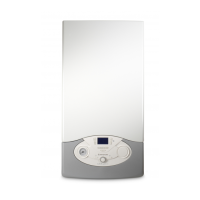
